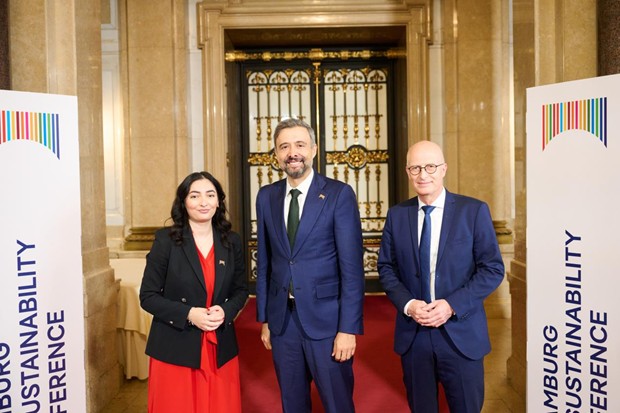At a critical juncture for global peace and prosperity, Álvaro Lario, President of the International Fund for Agricultural Development (IFAD), calls on Germany’s leadership as “essential to rekindle solidarity in a fragmented world” at the Hamburg Sustainability Conference (HSC) today. The high-level gathering convenes influential voices in international development, underscoring Germany’s role in shaping a fairer, more sustainable global future.
On the margins of the conference, Lario met with Reem Alabali-Radovan, Germany’s Federal Minister for Economic Cooperation and Development. President Lario reaffirmed IFAD’s commitment to deepening the strategic partnership with Germany in tackling hunger, poverty and to create decent job opportunities for young people and the most disenfranchised across the food systems in rural areas, where 80 per cent of the world’s poorest live.
Despite growing global wealth, the world today faces a surge in inequality, hunger, and a record number of armed conflicts and displaced people. Acute hunger has tripled since 2018, affecting nearly 300 million people in 53 countries. Extreme weather events, such as droughts, floods and extreme temperatures, are becoming more frequent and intense. Yet, development cooperation remains underfunded with an estimated US$4 trillion annual gap in financing needed to address the magnitude of these interconnected challenges.
“At this historic crossroads, Germany has a unique opportunity to catalyze private sector engagement and drive transformative change, helping bridge the widening inequality gap between the Global North and Global South,” said Lario.
IFAD’s President also advocated for greater investment for small-scale rural producers during a closed-door high-level dialogue, focused on financial flows to and from developing countries, and the reform of the current rules-based order to better serve both North and South.
“Investment in small-scale food producers is not charity,” Lario said. “It’s a smart investment in global stability, food security and fair supply chains. It reduces human suffering as well as the need for expensive emergency aid, lowers pressure from migration, and helps youth find opportunity in the communities where they reside.”
With 1.2 billion young people seeking decent work – nearly 90 percent of them in developing countries – rural youth face particularly limited prospects. Yet agriculture and food systems hold vast untapped potential. With the right investments, they could generate over US$4.5 trillion in new business opportunities annually and create more than 120 million decent jobs, turning migration into a choice rather than a necessity








